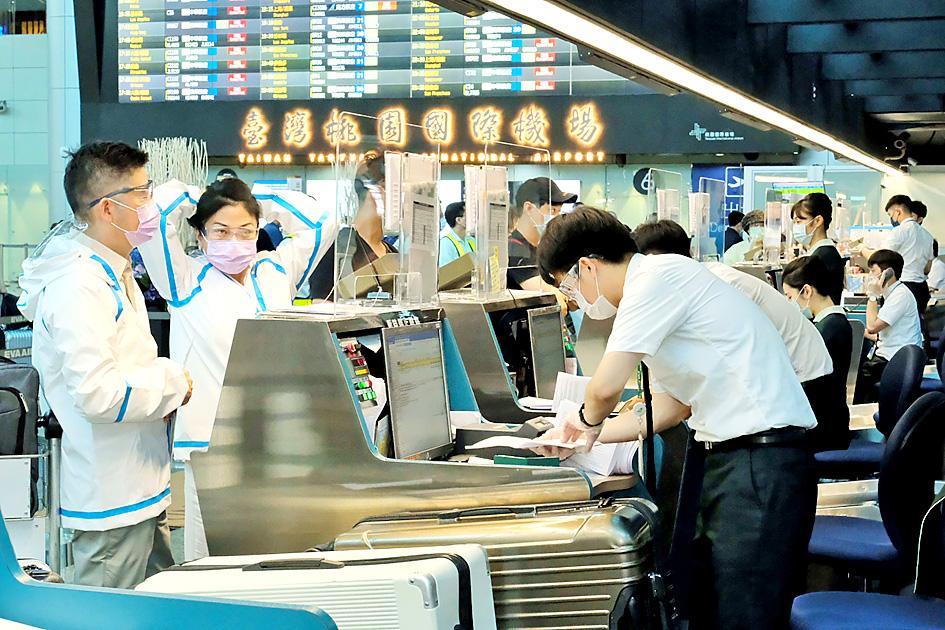With the US opening up to travel, demand in Taiwan for US-bound flights has soared, pushing up ticket prices to most destinations in North America, tourism sources said.
Fares for destinations in the US have risen dramatically since the middle of last month, and the trend is expected to continue in the coming months, as California on Tuesday lifted most social distancing and capacity limits put in place to contain the spread of COVID-19, ezTravel Co (易遊網) said in a statement yesterday.
The travel agency forecast that the number of tickets sold this month is likely to be double or triple the number sold last month, with tickets to San Francisco and Los Angeles in greatest demand.

Photo: CNA
To meet that demand, major carriers have increased their Taiwan-US flights, it said.
Since Monday last week, EVA Airways Corp (長榮航空) has been operating daily flights between Taoyuan and Los Angeles, up from three per week previously.
From July 1 to July 18, flights to Seattle, Washington, are to be increased to four per week, from two per week this month, while one more flight per week is to be added for travel to San Francisco and Vancouver, Canada, it said.
Round-trip fares for EVA flights to Los Angeles departing later this month or early next month are more than NT$70,000 for economy class, NT$90,000 for premium economy and more than NT$220,000 for business class, according to ezTravel’s Web site.
All of those fares are at least 50 percent higher than the prices offered by EVA prior to the pandemic.
China Airlines Ltd (中華航空), which on April 29 significantly cut back its flights after several of its pilots came down with COVID-19, has also said it would add flights to Los Angeles on Tuesday and Thursday next week and on June 29, and two more flights each next month and in August to Ontario, California.
From this month, China Airlines fares for flights between Taiwan and the US cost at least US$68,000 in economy class and about NT$230,000 in business class, Taipei-based Lion Travel Service Co (雄獅旅遊) said.
People who have booked tickets for the US generally fall into one of five groups: those who have a US passport, those who have a green card, those who are going to study in the US, the affluent, and foreign nationals residing in Taiwan, a Lion Travel executive said.

Taiwan Semiconductor Manufacturing Co (TSMC, 台積電), the world’s biggest contract chipmaker, booked its first-ever profit from its Arizona subsidiary in the first half of this year, four years after operations began, a company financial statement showed. Wholly owned by TSMC, the Arizona unit contributed NT$4.52 billion (US$150.1 million) in net profit, compared with a loss of NT$4.34 billion a year earlier, the statement showed. The company attributed the turnaround to strong market demand and high factory utilization. The Arizona unit counts Apple Inc, Nvidia Corp and Advanced Micro Devices Inc among its major customers. The firm’s first fab in Arizona began high-volume production

VOTE OF CONFIDENCE: The Japanese company is adding Intel to an investment portfolio that includes artificial intelligence linchpins Nvidia Corp and TSMC Softbank Group Corp agreed to buy US$2 billion of Intel Corp stock, a surprise deal to shore up a struggling US name while boosting its own chip ambitions. The Japanese company, which is adding Intel to an investment portfolio that includes artificial intelligence (AI) linchpins Nvidia Corp and Taiwan Semiconductor Manufacturing Co (TSMC, 台積電), is to pay US$23 a share — a small discount to Intel’s last close. Shares of the US chipmaker, which would issue new stock to Softbank, surged more than 5 percent in after-hours trading. Softbank’s stock fell as much as 5.4 percent on Tuesday in Tokyo, its

The prices of gasoline and diesel at domestic fuel stations are to rise NT$0.1 and NT$0.4 per liter this week respectively, after international crude oil prices rose last week, CPC Corp, Taiwan (台灣中油) and Formosa Petrochemical Corp (台塑石化) announced yesterday. Effective today, gasoline prices at CPC and Formosa stations are to rise to NT$27.3, NT$28.8 and NT$30.8 per liter for 92, 95 and 98-octane unleaded gasoline respectively, the companies said in separate statements. The price of premium diesel is to rise to NT$26.2 per liter at CPC stations and NT$26 at Formosa pumps, they said. The announcements came after international crude oil prices

SETBACK: Apple’s India iPhone push has been disrupted after Foxconn recalled hundreds of Chinese engineers, amid Beijing’s attempts to curb tech transfers Apple Inc assembly partner Hon Hai Precision Industry Co (鴻海精密), also known internationally as Foxconn Technology Group (富士康科技集團), has recalled about 300 Chinese engineers from a factory in India, the latest setback for the iPhone maker’s push to rapidly expand in the country. The extraction of Chinese workers from the factory of Yuzhan Technology (India) Private Ltd, a Hon Hai component unit, in southern Tamil Nadu state, is the second such move in a few months. The company has started flying in Taiwanese engineers to replace staff leaving, people familiar with the matter said, asking not to be named, as the